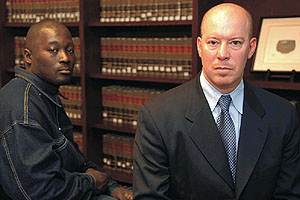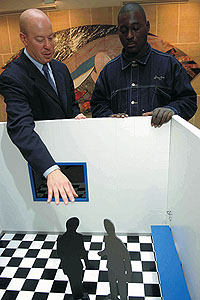University’s collaborative efforts win justice for ‘gentle giant’ Bell
By Sabrina L. MillerNews Office
 Last week, Craig Futterman (right), Clinical Professor in the Mandel Legal Aid Clinic at the Law School, heard the good news that a “six-year odyssey” had come to a close. The city of Chicago had settled a civil lawsuit that he had pursued on behalf of his client Corethian “Dion” Bell (left). The civil case was opened after Bell was cleared by DNA evidence in a criminal case against him. Bell had been falsely accused of and coerced into confessing to the rape and murder of his mother. The city of Chicago settled the case for $1 million, ending Bell's six-year battle in the courts.  Craig Futterman (left) explains how a model of a police interrogation room, like the one Bell was held in for 50 hours, was used in his arguments for the civil case against the city. | |
Securing justice for a Hyde Park area man falsely accused of murdering his own mother and coerced by Chicago Police into confessing to her murder was a “six-year odyssey” for Craig Futterman and the Law School’s Mandel Legal Aid Clinic. Last Wednesday, Oct. 10, that process culminated in victory with a $1 million settlement of a civil lawsuit filed against the city of Chicago.
Futterman, Clinical Professor in the Mandel Legal Aid Clinic at the Law School and Director of its Civil Rights and Police Accountability Project, said his client, Corethian “Dion” Bell would likely have neither been cleared of the crime nor received any restitution from city officials without intervention by the clinic, which pursues justice for poor and indigent clients.
Futterman along with Locke Bowman of the MacArthur Justice Center, formerly based at the University, had been preparing to take the civil lawsuit to trial. Bell filed a civil lawsuit in 2002 after DNA evidence exonerated him in the criminal case.
“I’m not surprised by the settlement but I am thrilled—thrilled—that we were able to obtain some real justice for Dion,” Futterman said.
Bell’s mother, Netta, had been raped and stabbed in her South King Drive apartment in July 2000. Bell discovered her body and called police. Bell, who suffers from mental illness, was held for questioning and after being interrogated for 50 hours by police, confessed on videotape to murdering his mother. He remained in Cook County Jail for 17 months until Randolph Stone and Herschella Conyers, Clinical Professors in the Mandel Legal Aid Clinic who handled the criminal case, sought and won a court order to test the DNA that ultimately exonerated him.
“This (case) was a true collaboration within the University of Chicago community,” Futterman said.
Bell had been known for years in the University community as a “gentle giant” who sold Streetwise newspapers and body oils in and around Hyde Park. He had charmed and befriended many Chicago graduate students, and because he was intermittently homeless, he sometimes slept at their homes.
“So when he was accused of this crime, everyone came to his defense, everyone he knew in the University community came to his defense and came to the clinic asking us to take the case because they knew he was innocent,” Futterman said.
Futterman said the manner in which Bell was interrogated had prompted Illinois and other states to change laws to require in certain instances the videotaping of the entire interrogation process. Futterman noted that it is still standard practice in Chicago to lock up witnesses in barren police interrogation rooms and to hold them incommunicado for extended periods of time, sometimes for two days or more.
“What happened to Corethian Bell was not an aberration; it is standard procedure with respect to witnesses. The practice is still in effect with Chicago Police and as long as it is maintained, more false confessions are going to be obtained and more innocent people are going to go to jail,” Futterman said.
Bell said he was ready to start a new chapter in his life and that the settlement money, which must still be approved by the City Council, will allow him to do that. He said he plans to get his GED and go to college and secure permanent housing. He said he was grateful to all of the faculty members and students at the Law School clinic who worked on his case since 2000.
“I’m very happy that they’ve been with me since day one, and they believed in me and helped me,” Bell said. “They did a real good job.”
![[Chronicle]](/images/sidebar_header_oct06.gif)